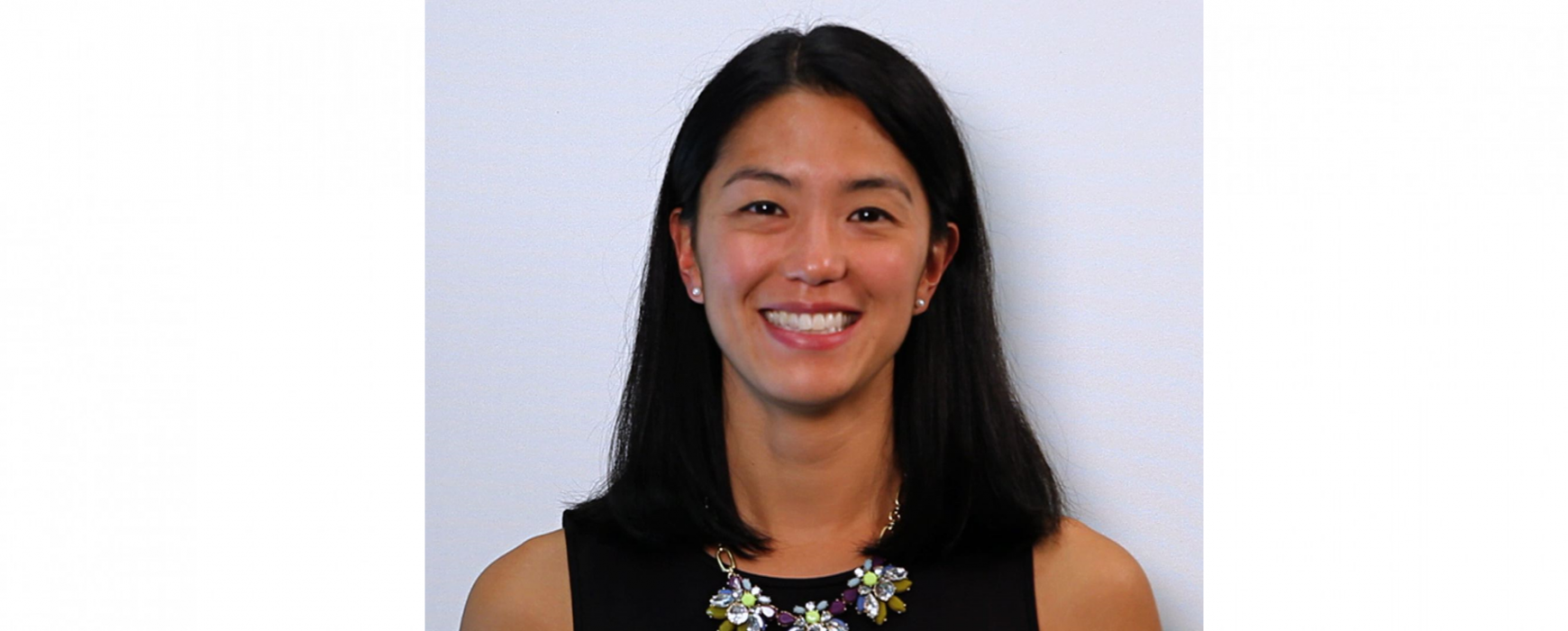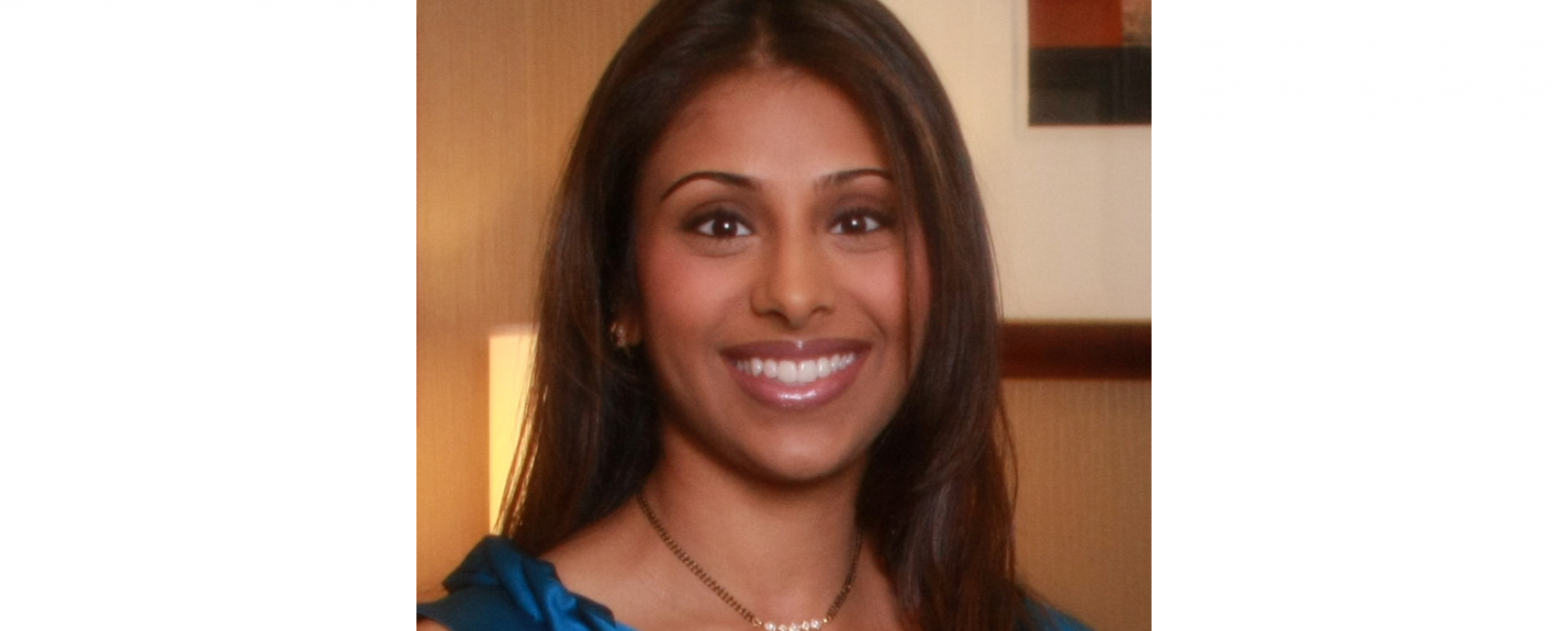Patient Story- Charlinda
As we wrap up Endometriosis Awareness Month, it’s only fitting that we share a patient story with you. Charlinda had endured years of pain and surgeries because of her endometriosis and wondered if she would ever be able to have a child. In 2017, she was referred to Dr. Miller. He performed surgery and three short months later, Charlinda conceived her son, Preston. Today is Preston’s 6th birthday! Charlinda shares her journey so that others won’t let a diagnosis like endometriosis discourage them from motherhood. Read Charlinda’s inspiring story below.
I remember how what first looked like a super sad day actually became a blessing in disguise. Sitting nervously in my OBGYN office, hearing her tell me she could no longer see me, felt like a huge break up. She was the only doctor I trusted since moving to Illinois. Due to the numerous endometriosis surgeries she performed on me and the fact that I wanted to become a mom one day, she felt there was another doctor who could better help me. With tears in my eyes, I reluctantly took the number of Dr. Charles Miller.
At the time, I was in my late 30s and not feeling particularly optimistic about meeting a new doctor and his staff for the first time. However, my OBGYN said Dr. Miller was the best in the area and I trusted her judgment. I walked into the waiting room and saw anxious couples and beautiful baby pics posted on the walls. At that moment I told myself my child will be on that wall one day. I finally met Dr. Miller who just returned from vacation, fully tanned and full of life. He listened intently as I explained my health journey and how I knew IVF financially wasn’t an option. It’s been some years but I do remember him saying this was not a problem and that he would get me as close as he could as though I would be an IVF patient. Per his recommendations, I exercised more and ate a healthier diet in preparation of my surgery to remove the endometriosis. I can honestly say after all of my other surgeries this one was the easiest recovery I ever experienced. I followed his plan to a tee and I conceived three months later. Now my son just turned 6 years old.
I know everyone’s journey is different but I share my story so others won’t allow a diagnosis that “may” increase infertility discourage you. Once realizing I was determined to defy the odds, I kept reminding myself what my parents constantly told me, fear and faith cannot live in the same house. I was so proud to announce to Dr. Miller I had a successful pregnancy. Once he knew I conceived, it was onto the next patient. This just goes to show his dedication to his craft. This is so important because I didn’t need him to hold my hand but to get me healthy enough for a fighting chance to conceive naturally. I was glad to get him quickly back to make other women moms. Words can’t express the gratitude our family has towards Dr. Miller and his entire staff!! Thank you.
Cervical Cancer Prevention- Q&A with Dr. Sasaki
January is Cervical Cancer Awareness Month. The American Cancer Society estimates almost 14,000 women in the United States will be diagnosed with cancer this year. However, with proactive measures, prevention is possible. We asked Dr. Kirsten Sasaki to explain the key aspects of cervical cancer, including risk factors, screening methods and the role of the HPV vaccine.
Q: Who is most at risk for cervical cancer?
A: Anyone who is sexually active is at risk for cervical cancer. Unprotected intercourse with multiple partners increases a patient's risk, as well as any conditions that may suppress one's immune system (HIV, being on chronic steroids).
Q: How do you screen for cervical cancer and how often?
A: I screen patients for cervical cancer by performing regular screening pap smears which look at the cells of the cervix, as well as testing for evidence of the HPV (human papillomavirus) virus.
Q: Do you recommend the HPV vaccine for prevention of cervical cancer? If so, who is eligible?
A: Yes, I recommend everyone get the HPV vaccine. It is best to get it around ages 11-12, but you can receive as early as 9 years old. Patients can receive the vaccine up to 45 years old, but it is less effective if you have already been exposed to the HPV virus.
Q: How does the HPV vaccine prevent cervical cancer?
A: More than 90% of cervical cancer is caused by HPV. The vaccine helps to build up your immune system to fight off an HPV infection, so if you are exposed to HPV in the future, your body may prevent it from infecting your cells, and thus placing you less at risk for cervical cancer.
Q: What is the one thing you would like your patients to know about this disease?
A: I would like patients to know that cervical cancer can be prevented with vaccination and regular pap smear screening. Do not be afraid to get a pap smear, because most patients who develop cervical cancer have not been screened with a pap smear for many years.
Dr. Sasaki emphasizes the importance of regular screenings and vaccination as powerful tools in the prevention of cervical cancer. To schedule an appointment with Dr. Sasaki call 630-428-2229 or request one online.
Patient Story- Breda
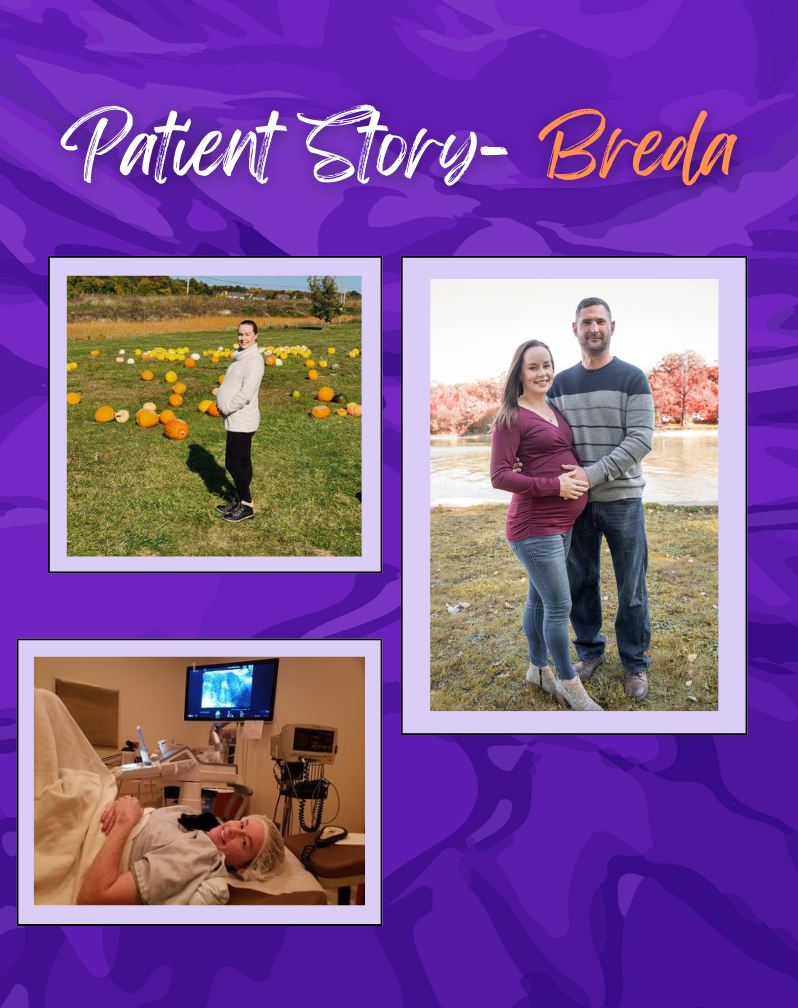
“Not everyone will understand IVF or be able to relate, so it’s important to surround yourself with support. More people than you realize struggle with infertility.”
Today’s patient story is from Breda. After not finding success or feeling comfortable at another fertility clinic, Breda came to us. We are all glad she did! Dr. Miller was able to diagnose her with endometriosis and after surgery and IVF, she was able to get pregnant. Breda is due in January!
Breda writes:
I met my husband later in life and we got married when I was 38. I was and still am wary of the stigma of older mothers, even though being older is accepted. I’ve always wanted a family and we started trying right away, but I had three miscarriages in a year and a half. I was at a different fertility clinic for a year, but didn’t feel comfortable there. My husband’s colleague recommended we see Dr. Miller and what a difference!
We first met online during COVID and Dr. Miller told us, “You’ll be a mother, kiddo.” He was so kind, didn’t rush us, and he explained everything. He learned I was an English teacher and told me a story that put me at ease. He never stopped his storytelling, and I welcomed his personable demeanor after some bad experiences at the previous clinic. Dr. Miller found issues that the previous doctor did not, including endometriosis.
After a biopsy, Dr. Miller found abnormalities in my uterus and I was diagnosed with Level 1 endometriosis. During surgery, he removed five spots on my uterus. I also had the Endometrial Receptivity Assay biopsy to determine the receptivity of the uterus to implantation. Soon after, we had an egg retrieval and two transfers.
Throughout this process, Dr. Miller and his staff explained everything so thoroughly and never seemed irritated or disinterested when I had questions. I also got to know Dr. Miller and the nurses because they talked to me during appointments. I always felt people cared and were invested in our success. I felt so secure going into our procedures and never felt anxiety or stress visiting the office.
Even though our first transfer failed, a second embryo implanted and I will never forget that experience. Dr. Miller, Courtney, and Melody were present for the transfer, and made me feel so comfortable. Dr. Miller even told us a funny story about meeting an actor from Will & Grace. While we waited after the transfer, my husband and I held hands and prayed, and we also talked about how wonderful it would be if it worked. Many times, we dreamed of finishing our nursery and being able to move forward with our plan. The transfer worked, and our baby is due January 8, 3.5 years after we began IVF and what seems like a million doctor appointments.
I was very nervous the first 12 weeks of my pregnancy and braced myself for bad news, but at every ultrasound Courtney reassured me with her positivity. We are so grateful for everyone at the Naperville office.
It took until I was about 20 weeks pregnant for me to relax and realize we’re finally going to be parents! I’ve cried many happy tears for a change! Not everyone will understand IVF or be able to relate, so it’s important to surround yourself with support. More people than you realize struggle with infertility. Meditation and journaling are helpful (as well as long walks with our dog, my first baby). Finally, never stop hoping and praying, even if you’re an older mother!
Patient Story- Julia
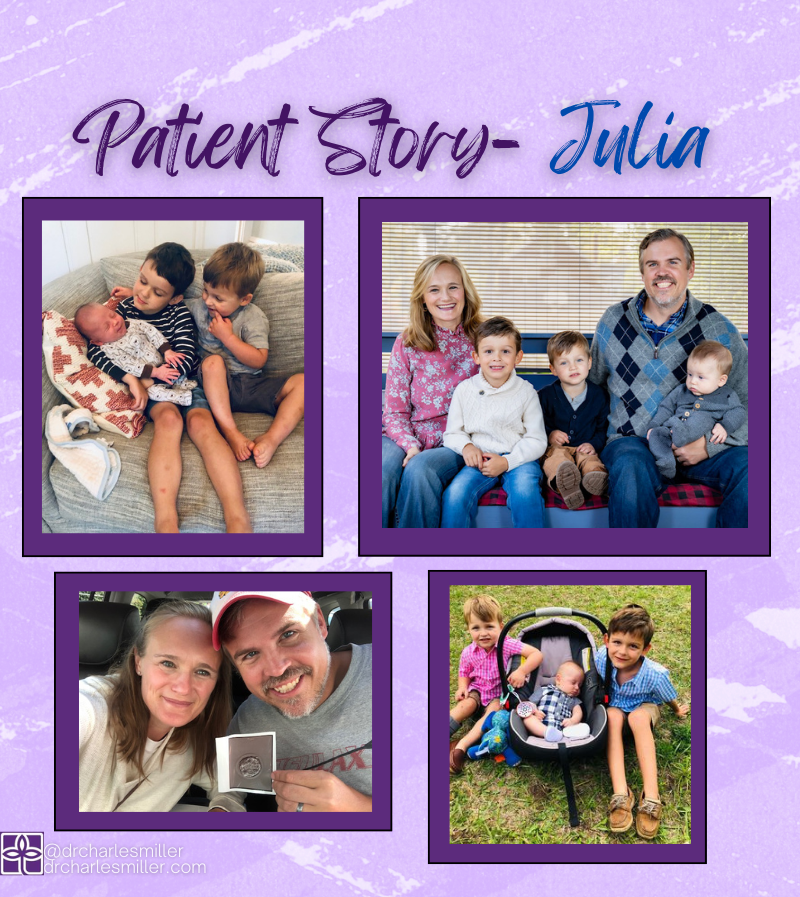
“This is why you keep fighting; so that you can have peace. Whatever outcome will bring you peace, that is what you fight for.”
Julia is a patient that our office has known for quite some time. She recently welcomed her third baby boy and we have enjoyed getting updates and pictures throughout the years. A seasoned IVF veteran, Julia has been through it all and yet she is incredibly candid about her experience. This openness has led her to volunteer to answer calls for the Resolve support line twice a month. While there aren’t many calls, she is so grateful when she gets to speak to someone and give them some hope. We are so grateful that Julia has shared her story.
She writes:
The other day, I took my two older boys to the fire station open house. It was absolutely packed, it seemed like everyone from our town was there. I looked around at all of the children, moms, dads, siblings, grandparents, etc. and had a moment of self-doubt.
“I don’t belong here,” I thought to myself. “This event is for families.”
As if on cue, my middle son reached up to hold my hand, and my older son ran ahead and called out for me. “MOM! This way, follow me!”
I was instantly brought back to reality, my feelings of insecurity disappearing and belonging restored. I am a mom (of three boys!), and I DO belong at family events, school drop-off, parent-tot classes, parks and baby pools, and in the club that is Parenthood.
The lingering grief and pain of infertility can rear its ugly head at the strangest moments, like it did that Saturday morning. I remember the feeling of fear so well; the fear that I would never become a mom. I know all too well how painful the treatments and the unknowns are as I fought long and hard for my boys. However, I also know the peace that comes from a dream achieved. I want to instill hope in anyone who has that fear and pain, who is in the throes of fertility treatment, who is struggling with self-doubt and the unknown.
I have three beautiful and healthy boys. They are almost perfectly spaced apart; 2.5 years. From the outside looking in, we are a very typical family. And in most senses, that is correct – except for how our family was created.
We waited four years for our first son. I worked for one year with my ob-gyn and Clomid. I then had six stimulated rounds with my first fertility specialist and one miscarriage. When I met Dr. Miller, I had two more failed IVF rounds before we chose to use a donor egg. I had a polyp removal surgery. I did three trial cycles to determine the optimal window for an embryo transfer. We lost our first donor due to poor response to stimulation while I was on hormones alongside her. With our second donor, my first transfer was a blighted ovum that ended in two separate D&C surgeries. After extensive blood work, I was diagnosed with MTHFR, a genetic blood-clotting disorder that can affect implantation.
On November 9, 2016, my 13th cycle, I became pregnant with my first son.
Charlie was cycle 13. James was cycle 15. John was cycle 16.
I share the details of my journey not to overwhelm you, but to give you strength. Maybe your journey will be shorter than mine. Maybe it will be longer. It often felt daunting, hopeless at times, and never-ending. I remember the receptionist at Dr. Miller’s office pulled out my file. It looked like several copies of the Yellow Pages stacked on top of each other. During one of my meetings with Dr. Miller, he put his hand on top of that file and said, “Julia. We haven’t been through this much, for you to not get pregnant. I WILL get you pregnant.” I trusted him and pushed forward despite the fear and pain.
This is why you keep fighting; so that you can have peace. Whatever outcome will bring you peace, that is what you fight for. And you will know when that time comes. People ask me how I did it. They want to know how I managed the appointments and driving, the shots and tests, the physical side effects and emotional trauma, the disappointment and the grief.
I tell them the truth; you just do it. You have to keep going so that you can have your peace.
I promise that the grief and fear will fade with time. It might make an appearance here and there after you have achieved your dream, but that is just a little bit of PTSD from the journey. It will fade. You will hold your little miracle, you will walk with your child at the fire station open house, or into that parent-tot gym class, or to the first day of preschool, or story hour at the library and you will belong. You will feel peace.
Believe in Dr. Miller. Believe in his nurses, the ultrasound techs, the phlebotomist, his entire staff. Throw in some prayers, push forward, and wait for your time to come.
Overcoming Fertility Issues
Fertility is a tough area to navigate, especially when you hear of other people’s seemingly easy success at becoming pregnant. Baby showers, ultrasound photos, gender reveals, even baby shops can be hard to take. While fertility issues are actually not uncommon, it’s still a hushed topic that few are willing to discuss or admit.
While it seems that everyone else’s fertility is right on par, it’s important to understand that you don’t actually know their back story unless they tell you outright. For all you know, your co-worker has been trying to get pregnant for months. Or some other acquaintance miscarried or lost a baby. They’re more likely to display the happy signs of pregnancy, but they’re less likely to announce their fertility struggles.
Sometimes, it’s easiest just to assume that people had a more difficult time fertility-wise than they’re letting on. For some people, they might have more trepidation about announcing their successful pregnancy or are just private people, but others might be so elated that they finally were able to get pregnant, fertility issues and all, that they’ll announce it to the world.
If you’re experiencing fertility issues and feel helpless, depressed or generally sad, it helps to build a solid network of people you can rely on. Reach out to family and learn more about their own fertility issues. Sometimes fertility issues run in the family. Talk to your friends; even if they didn’t experience any problems getting pregnant, they are bound to know people who have. Look for support groups in your neighbourhood or even online. Lastly, talk to a therapist about what you’re feeling.
It’s also important to find a fertility specialist who is reputable. While it would be ideal to find a doctor who can double as a therapist, however, it’s better to let the fertility specialist focus on your physical health while a therapist can help you through the more emotional aspects. It’s important to keep in mind that sometimes the best fertility specialists might not have the time or personality that matches your emotional needs. At the same time, it’s crucial that the fertility practice explains your options and procedures clearly to you. They may also have a mentor program in which they can partner you with other patients or former patients who can help you through the whole process.
While stress over fertility issues is quite common, it can help to try some activities that reduce the stress. Yoga, meditation, t’ai chi, or even walking with your partner can help boost circulation and relieve some tension while also spending time together.
Her Own View: A Patient’s Journey Through IVF (Day 26)- Final Preparations and Waiting for Transfer Day
As you might recall from my last post, I had 30 eggs collected, and 10 made it to Preimplantation Genetic Screening (PGS). Out of those 10, five were considered genetically normal. They do know the genders of the normal embryos, but we’ve decided we don’t want to know. We have asked for the best quality embryo to be implanted during our Frozen Embryo Transfer (FET). To be honest, I’m a little surprised that we only had five come back genetically viable. As a 31-year-old, I expected a greater ratio to come back normal. Don’t get me wrong, I’m very, very grateful for having five healthy embryos. I’m also glad I did the test to up my chances of a successful pregnancy. Dr. Miller says that even in your 20s and 30s, a large percentage of eggs are genetically abnormal. Add to this, the fact that sperm can also be abnormal, it is not surprising that only 50% of the embryos were tested to be normal. He said to have five embryos tested and healthy is really very good.
This week, I went in for my FET consultation where they went over my schedule in detail. An FET is great because I now have a pretty solidified schedule for the next month and a half, so I can plan my life. The schedule was based on my ovulation, but unfortunately, I did not ovulate naturally this cycle yet. This happens sometimes because of all the stimulants in my system from my retrieval and hormones can sometimes throw off your cycle. Because of this, I was instructed to inject 3ml of Progesterone in Oil (PIO) intramuscularly to induce my period. I should have my period in the next 7-10 days and they will be able to better control my cycle once that happens. I found the PIO shot to not be as bad as people made it out to be, but again, this was my first one! I used a heating pad before/ after and massaged the contents of the shot into my bum. I was also instructed to start my Lupron injections on Friday.
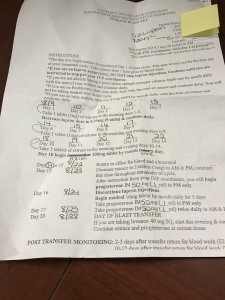
After that, I start taking Estrace which helps build the lining to allow a successful implantation, Progesterone to help nourish the lining to maintain implantation and a few other things in preparation for my FET on August 28th! I do have to go in for a few more blood/ultrasound tests in the next week, but transfer day is coming up fast! I’m a little nervous that I won’t get my period, which could delay things, but it’s completely out of my hands! I’m just going to focus on self-care for the next month, and make sure I’m doing everything I can to keep myself healthy and happy!
-Katie
Meet Dr. Kirsten Sasaki: Educating and Empowering Patients
I love being a gynecologist because I have the privilege to help women achieve better health. My goal as a doctor is to educate, inform and empower my patients so that we can work together as a team. Gynecology is a sensitive field and let’s face it, we all know how awkward an appointment and exam can be. I want women to feel comfortable discussing their concerns and issues without any judgement.
Often as the caretakers of their families, women push their own health aside. It is my job as a physician to work with my patients to ensure they prioritize their own health so they can continue to be healthy, strong and present for their families and loved ones.
Additionally, during many of my consultations, I act almost as a teacher by drawing figures and diagrams to help my patients and their family fully understand their disease and the various treatment options. So, when it comes time for treatment, the patient, her partner and her family are well-informed and ready for the next step. It is so important that patients know what to expect during and after their procedure. Listening to their worries, answering their questions and assuaging their anxieties is also a crucial part of the treatment process. I want to know what concerns them and want them to feel at ease that I have it covered. As I said, we are a team, and as a teammate I must work with my patient and guide her hand-in-hand through the process.
It’s almost ironic because not only do I consider myself a teacher of medicine, but I am also an eternal student. I have a love of learning, and practicing medicine allows me to consistently learn new things. Every day and every patient are always different and give me the opportunity to learn as I heal.
The best part of being a doctor is seeing and talking with patients I have helped. They are able to move on and enjoy their lives without having to deal with an issue that plagued them – for days, weeks or even years. Each patient has her own story, problems and goals and I love getting to know my patients in order to determine the best individual treatment plan.
I look forward to contributing more blog posts and helping women feel empowered to be an active participant in their healthcare. Reach out to us in the comments below, contact us through our website and be sure to follow our Facebook page.
Be Well,
Dr. Kirsten Sasaki
Introducing Dr. Cholkeri-Singh: Healing with Heart
When I first heard our practice was starting a blog, I couldn’t wait to write my first post. I plan to write about a variety of topics, but thought it was important for you to get to know me, understand the reason I became a physician and why helping women is so important to me.
My journey into medicine began when I was only five years old. I watched my mom struggle with a medical condition, and I desperately wanted to help fix her. As I grew older, my mom had us volunteer in shelters, and I began to enjoy servicing my community. It was then I figured out how to combine the two passions – becoming a physician would allow me to help my community and heal those with medical issues.
I specialize in gynecologic care and surgery, and I can’t imagine doing anything else. Going through my clinical rotations as a medical student, I was exposed to a variety of specialties. At first, I was drawn toward primary care because of the appeal of building long-term relationships with my patients, but at the same time, I was intrigued by surgery and the journey it takes to help cure a patient of his/her suffering.
My competing interests made it difficult for me to pick a specialty, and it wasn’t until my last medical school clinical rotation in OB/GYN that I knew for sure where I wanted to be. This field allowed for continuity of care with women while also incorporating surgical therapy for those where primary medical therapies failed. I was drawn to the subspecialty of minimally invasive gynecologic surgery and pursued a fellowship to refine my skills in surgery. This has enabled me to offer advanced surgical solutions to my patients with improved recovery times, and I am truly grateful that I am able to fulfill my childhood dream as a result.
As a physician, I understand that my patients want to feel heard and validated. They motivate me to listen, be patient and go the extra mile. I always try to be humble and treat patients to the best of my ability while constantly striving for excellence in care.
The best part of my job is receiving the smiles, the hugs and thank yous from patients whom I have helped. Whether it be providing medical counsel or performing a successful surgery to improve quality of life, their gratitude is priceless to me.
As a leading educator in the world, I am very thankful for the opportunities to teach and learn from colleagues across the globe. Not many physicians have this opportunity, so I embrace the opportunity, and I have grown significantly as a physician and human being because of it.
As Dr. Miller said in his post, we truly want this blog to be a resource for our patients and others looking for support in meeting their health goals. I’m excited to be a part of this blog and look forward to hearing from you. Reach out to us in the comments below or contact us through our website and be sure to follow our Facebook page.
Wishing you the best of health,
Dr. Cholkeri-Singh


